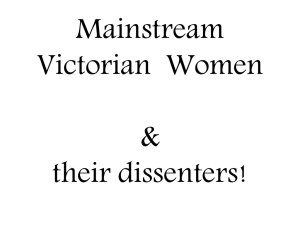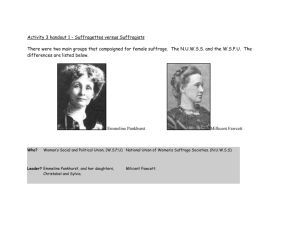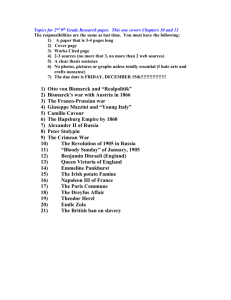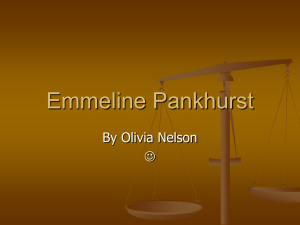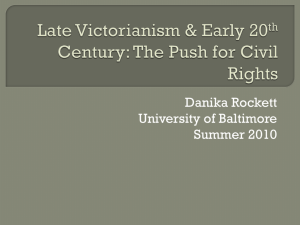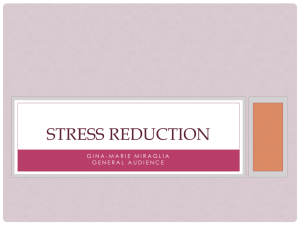THE OLIVE BRANCH CENTER FOR B A L L
advertisement
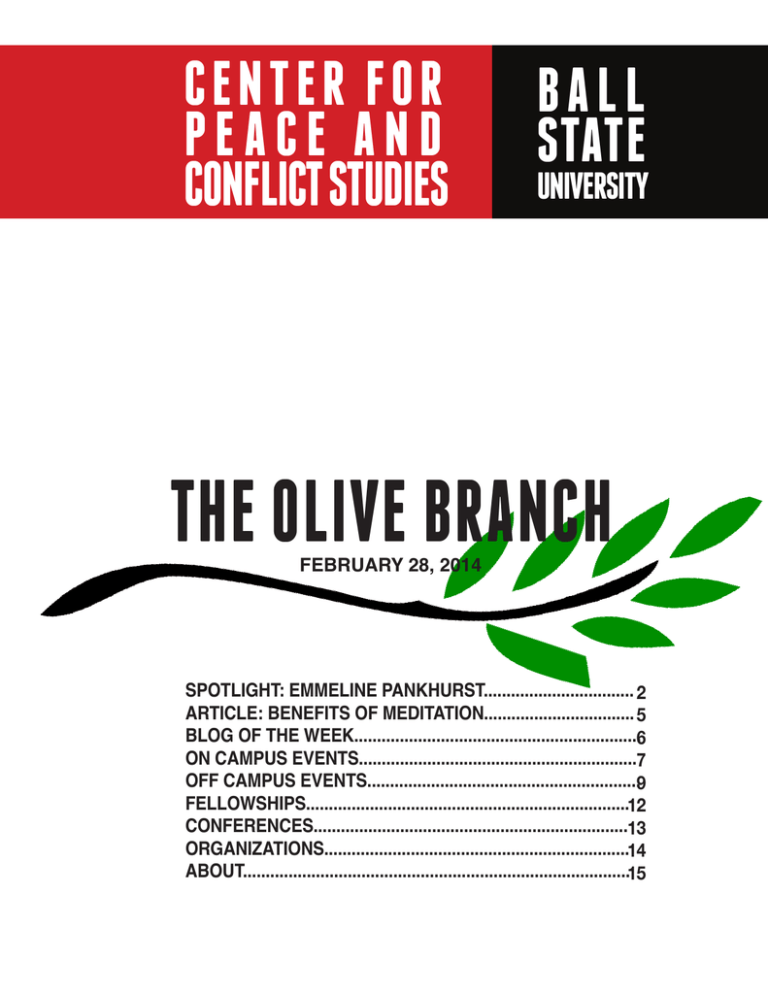
CENTER FOR PEACE AND CONFLICT STUDIES BALL STATE UNIVERSITY THE OLIVE BRANCH FEBRUARY 28, 2014 SPOTLIGHT: EMMELINE PANKHURST................................. 2 ARTICLE: BENEFITS OF MEDITATION................................. 5 BLOG OF THE WEEK...............................................................6 ON CAMPUS EVENTS.............................................................7 OFF CAMPUS EVENTS............................................................9 FELLOWSHIPS.......................................................................12 CONFERENCES.....................................................................13 ORGANIZATIONS...................................................................14 ABOUT.....................................................................................15 2 IN THE SPOTLIGHT EMMELINE PANKHURST EMILY HART Emmeline Pankhurst, born in 1848 Manchester, was a British suffragette and social activist. In pursuing her life’s goal of winning women not only the right to vote, but equal rights on all levels of British society, she influenced scores of future feminists and was a crucial component of the women’s suffrage movement. Growing up, Emmeline was surrounded by the political and social activism of her parents. However, though her family was comprised of suffragists and abolitionists, Emmeline was denied the educational advantages of her brothers. Despite her love of reading and precociousness, her parents thought it more appropriate to teach her to become a sophisticated housewife and believed that she was incapable of advancing as far in the educational realm as her brothers. It is said that as a young child, Emmeline overheard her father lamenting that it was “a pity she wasn’t born a lad.” It may have been because of this early personal discrimination that she soon embraced the women’s suffrage movement. As a young teenager, she began reading her mother’s copies of the Women’s Suffrage Journal and went to see its editor, Lydia Becker, lecture on women’s rights. Following Becker’s address, Emmeline became, in her own words, “a conscious and confirmed suffragist.” At the age of 20, Emmeline met and fell in love with women’s suffrage and freedom of speech advocate Richard Pankhurst. She had suggested to Richard that they avoid the legal requirements and formalities of a state-sanctioned marriage by simply entering into a free union; however, as a lawyer, Richard knew that such an arrangement would prevent them both from being taken seriously in politics, and could force Emmeline into a status of social condemnation. Given her desire to be active in the worlds of political and social justice, she agreed to marry Richard. Over the next ten years, Emmeline and Richard had five children, including future social activists Christabel and Sylvia. Though she was devoted to them, she and her husband believed that she should eschew the traditional female role of “household machine” and should continue her political activities. Hiring a servant to help raise the children and keep house, Emmeline was able to devote much of her time to the Women’s Suffrage Society. As was the case in her own childhood, Emmeline made sure that her children were brought up in an atmosphere of social justice, hosting notable abolitionists, social activists, and anarchists as houseguests to broaden her children’s minds. In 1888 Emmeline became a member of the National Society for Women’s Suffrage; however, a schism occurred in the group when many of the members did not support suffrage for married women, assuming that they did not need the vote since their husbands could vote for them. Emmeline disagreed with this mindset and formed her own organization, the Women’s Franchise League. This group soon became seen as radical by many suffragists because it did not only support women’s right to vote, but also advocated for their equal rights in cases of divorce and inheritance. The seemingly far-left status of the organization caused it to disintegrate within a year of its creation, but it paved the way for Emmeline’s future activism. In 1893 Emmeline Pankhurst began to emerge as an activist in her own right and became well known throughout England for her social and political work. In addition to her advocacy for women’s suffrage, she also became active with the Independent Labor Party. Through the ILP, she became a Poor Law Guardian and worked to improve the status of England’s impoverished, particularly those in the country’s degenerative workhouses. The conditions of these workhouses appalled her, and she was “horrified to see little girls, seven and eight years old their knees scrubbing the (continued) 3 IN THE SPOTLIGHT EMMELINE PANKHURST (CONTINUED) cold stones of the long corridors … pregnant women doing the hardest kind of work, almost until their babies came into the world…” Even after the loss of her husband in 1898, Emmeline continued to work to improve the livelihoods of women across England. That year she took on a position as the Registrar of Births and Deaths in Chorlton, Manchester. This work, she later said in her autobiography, gave her particular insight regarding the inequality with which women were treated in their day to day lives. She observed dramatic differences in the ways men and women were treated in cases of poverty, unemployment, and illegitimacy. This reinforced in her the desire to get women the right to vote, believing that suffrage would help reform England’s patriarchal society. By 1903, Emmeline had grown tired of what she had perceived as ineffective advocacy by moderate suffragist groups. In response to this, she founded the Women’s Social and Political Union, an organization reliant on direct action. The WSPU began rallying, making speeches and holding sessions of a “Women’s Parliament” that coincided with official government meetings. Around this time, a Daily Mail journalist referred to these women using the diminutive term “suffragette” rather than the standard “suffragist” in an attempt to demean their actions; however, Emmeline and her allies embraced the term and utilized it to dis- tinguish their cause as a radical organization. Often their rallies and protests were met with police force and public ridicule; in 1908 Emmeline was arrested for the first time and sentenced to six weeks in prison under the charge of “obstruction.” During her trial she told the court, “We are here not because we are law-breakers; we are here in our efforts to become law-makers.” Through this experience she began to see imprisonment as a tool to publicize the urgency of women’s rights. Later that year, 500,000 women’s suffrage activists rallied in Hyde Park to demand the vote for women; when the prime minister and other state leaders responded with apathy and indifference towards their efforts, the WSPU decided to increase the severity of their crusade. Emmeline began to participate in hunger strikes, which became a common method for imprisoned suffragettes to garner attention for their cause. As news of these hunger strikes spread across the country, the government began to retaliate against the activists. Prison authorities routinely force-fed striking inmates with painful feeding tubes, which Emmeline described as “horror and torment” and “sickening violence.” After medical professionals decried this procedure, the British Government enacted the “Cat and Mouse Act”; this legislation, which got its nickname from the way it imitated a cat playing with its prey by releasing and re-catching it, allowed self-starved inmates to be released when they became seriously ill, but to also (continued) One of the instances Pankhurst was forcibly detained. Getty images. 4 IN THE SPOTLIGHT EMMELINE PANKHURST (CONTINUED) “ was put on hold during the First World War in 1914, but she continued to support other forms of social activism. Concerned with the welfare of the women and children left behind as England’s men went off to fight, Emmeline lobbied the government to allow more women to enter into the workforce. She also offered relief services to single mothers, including those with children born out of wedlock and orphans. Emmeline ended up adopting four young children herself at the age of 57; when asked how she could take on such a responsibility at her age, and with no steady income, she responded, “My dear, I wonder I didn’t take forty.” Following the war, Emmeline refocused her mission on promoting women’s suffrage, an end to sexual double standards, and equality in marriage laws, pay, and employment opportunities. She experienced a great victory when a bill was passed that allowed women to run for the government’s House of Commons. Her daughter, Christabel, stood for election. Though she lost, it was by a very slim margin, illustrating progress in women’s equality. Another victory came in 1918 when the Representation of the People Act was passed, allowing women over the age of 30 who met certain property qualifications to vote. Emmeline Pankhurst passed away in June of 1928 at the age of 69. A month later, her quest for women’s suffrage was rewarded when the right to vote was extended to all women over the age of 21. Emmeline’ death was met with national mourning, and media outlets around the world eulogized her tireless efforts towards women’s rights. In 1930, at an unveiling of a memorial for Emmeline, England’s Prime Minister Ramsay MacDonald compared her to Martin Luther and Jean-Jacques Rousseau. Soon after, her portrait was added to the National Portrait Gallery. Many years later, in 2002, Emmeline Pankhurst was voted as one of the U.K.’s 100 greatest citizens. I say with no fear of contradiction, that whatever view posterity may take, Mrs. Pankhurst has won for herself a niche in the Temple of Fame which will last for all time. – Prime Minister MacDonald at the unveiling of Emmeline’s memorial “ be re-arrested and imprisoned upon recovery. In response to this act, Emmeline worked to evade police through the use of disguises; when this failed, the WSPU established a team of female jujutsu-trained bodyguards to protect Emmeline from the often violent police. In 1910, a piece of legislation known as the “Conciliation Bill” was put forth to the government. This bill, though it was limited in its allocations, would have still been a significant step in allowing women to vote. In hopes that it would pass, Emmeline and her allies enacted a truce on their more radical actions, including the hunger strikes. However, when the bill died the WSPU led a 300-person protest march to Parliament Square. The protest was met with violent police force, with officers punching the marchers and pulling them by their hair and breasts. This incident, which became known as “Black Friday,” galvanized more of the public to support women’s suffrage. Emmeline’s work for suffrage 5 MEDITATION KATE GIGLIO “ “ ARTICLE Meditation is acceptance. It is the acceptance of life within us, without us and all around us. Acceptance of life is the beginning of human satisfaction. Transformation of life is the culmination of divine satisfaction. – Sri Chinmoy Meditation is an art. To be able to center all of your energy to one area takes an incredible amount of focus. When meditation is practiced actively it can lead to indescribable states of peace and profound joy. The practice of meditation dates back to ancient times in the Eastern World, and has taken thousands of years to evolve into the daily practice that we know today. Meditation is a practice that helps people achieve balance both physically, mentally, and emotionally and can even be used to treat depression, stress and anxiety. Meditation is practiced as a tool in many religious denominations around the world. Hindus have been meditating for thousands of years and they refer to meditative states as “samadhi.” Hinduism observes several different meditation methods, all of which stem from yoga. The goals of Hindu meditation can vary from spiritual enlightenment to attitude transformation and has been described as “a journey to the deeper part of one’s being.” Another religion that observes the practice of meditation is Buddhism. Meditation is of high importance to many Buddhists who believe that meditation helps to develop the awareness and the energy needed to transform embedded habit patterns. The Buddha taught numerous types of meditation, each designed to overcome a particular problem or to obtain a particular psychological state. The two most common and practical types of Buddhist meditation are Loving Kindness Meditation and Mindfulness of Breathing. These types of meditation are practiced by Buddhists as part of the path towards Nirvana. A third religion that recognizes the practice of meditation is Christianity, derived from the actions of Christian Monks. Christians view meditation as a form of prayer, a way to reflect on God’s message, and as a technique to strengthen their relationship with God. Many Christians believe that the power of meditation derives from one’s faith and their personal connection with God and it is viewed as a time to listen for God’s callings. Meditation has the capacity to open up the common ground between all cultures and faiths today. Studies show that there are many potential health benefits to practicing meditation. In a study done at the University of California, Las Angeles, researchers found an improvement in the immune system of the individuals who completed an eight week meditation course (Troy Dunham, The Huffington Post). In addition, the researchers discovered that there was a potential for decreased development of heart disease. In a study at the Benson-Henry Institute for Mind Body Medicine in Boston, patients suffering from hypertension, more commonly known as high blood pressure, were instructed to complete a meditation plan developed by cardiologists. After several months of meditation, two-thirds of the patients were able to reduce their blood pressure medication. In addition to these health benefits, meditation is proven to reduce stress levels, providing a healthier mental state. It is said that peace must begin within the person. Meditation is an effective way to heighten mental clarity, alleviate stress, and achieve a tranquil state of quiet inner reflection. Meditation can be used as a tool to renew our mind, body, and soul. THE CENTER FOR PEACE AND CONFLICT STUDIES OFFERS A MEDITATION ROOM. FOR MORE INFORMATION: CONTACT GEORGE WOLFE AT WMWOLFE@BSU.EDU. 6 BLOG OF THE WEEK CHELSEA SMITH By understanding the challenges they both faced, I realized that resiliency is important when it comes to peace work and advocacy. Lemkin was still sending draft laws to publishers and government officials while a refugee. He was the definition of determined. While reading A Problem from Hell this week, I realized the key is to make a problem personal, to ourselves and to potential supporters. Morgenthau was linked to the Armenian people. He saw them as his own. Lemkin saw firsthand the tragedy of war and experienced being targeted purely because of his heritage. These men knew the consequences of inaction and who the victims were. Lemkin wrote about the importance of people connecting to the issue and made an important observation about people living in peace time, who have not seen the crimes firsthand. This is an important observation because when people disconnect from an issue or believe that it could not happen, we become a lone advocate without any change resulting from our work. The issue must become personal and real to others. Lemkin was inspirational with his persistence in getting people to understand the importance of acknowledging and fighting against genocides. The problem was inherently personal to him, and over trial and error he learned how to make it personal for others as well. In a social entrepreneurship course I am taking this semester, we have been brainstorming continually about what matters to us individually; what issue can we get behind and not struggle be passionate about. Others can tell when we are excited about something, and we become much more likely to leave an impact. On another note, Morgenthau’s advocacy for the United States to get involved with the Armenian genocide posed some questions for me. What exactly should the US have done? bombing Syria was the best solution to stop the injustice happening, but I knew that doing nothing wasn’t the answer either. Morgenthau and Lemkin faced this problem as well. Governments recognized the injustice, but did not like the options presented to them. I believe we must get more creative with our solutions in order to have any real change. While violence is not the answer, passivity is not either. Dualistic views and, in turn, options are limiting to what can be done. I have learned a lot about this in French class since France trends to be pluralistic. “ While reading about the dilemma the US not getting involved, I thought about how drastically different our government is today. We have gone from not getting involved with foreign affairs, to becoming self-proclaimed “world police.” I was reminded of the most recent dilemma in Syria. We wanted to do something, but there wasn’t a great solution from any angle. I personally did not want our government to decide that As a culture, they don’t like having just two options. I tend to agree with this thinking because it leaves room for creativity and other solutions. In my opinion, this will be important when trying to change policies and opinions. The prospect of atrocity seemed too remote, the notion of a plot to destroy a collective too inhuman, and the fate of vulnerable groups too removed from the core interests of outsiders. -Samantha Power “ The ideas of international justice were truly challenged by Morgenthau and Lemkin. I was inspired as I read about their lives and roles in advocating for action against genocides during WWI and WWII. 7 EVENTS ON CAMPUS THIS WEEK EXCELLENCE IN LEADERSHIP SERIES: “PHILANTHROPY, LEADERSHIP, AND ENTREPRENEURSHIP: STARTING FEED PROJECTS” Monday March 3 @ 7:30 pm Pruis Hall LEADING CHANGE WORKSHOP SERIES: COMMON ATTITUDES AND FEELINGS TOWARD THOSE WITH DISABILITIES Monday March 3 @ 7:00 pm L.A. Pittenger Student Center Cardinal Hall C Lauren Bush is the Chief FEEDer and Co-Founder of FEED Projects, a charitable company with the mission of creating good products that help feed the world. Many people have certain attitudes and feelings toward people with disabilities based on stereotypes portrayed in media. At the podium, Lauren speaks about philanthropy, hunger, and global issues. This workshop will highlight the realities of those living with disabilities and help participants identify and challenge their own attitudes toward people living with disabilities. BRUCE F. & ILDIKO B. MEYER MEMORIAL LECTURE: “CELEBRATING MARRIAGE IN JEWISH ART: MEDIEVAL AND EARLY MODERN PERSPECTIVES” Monday March 3 @ 7:30 pm Bracken Library Room 104 Join us for a lecture by Sharon Liberman Mintz, Curator of Graphics at the Jewish Theological Seminary of America. This event is being sponsored by the Honors College, the Zeigler Committee for Jewish Studies, and the Friends of Bracken Library. Please register at: http://www.bsu.edu/forms/studentlife/leadingchange/ “FOOD INC.” FILM SCREENING Tuesday March 4 @ 7:30 pm Pruis Hall Join us for a special film screening of a documentary that exposes the reality of the corporate food industry in America. Doors open at 7:00 p.m. Admission is FREE! POVERTY STIMULATION Wednesday March 5 6:00-8:30pm L.A. Pittenger Student Center Ballroom The Department of Sociology invites you to attend this role-playing opportunity to learn more about the reality and barriers that people in poverty face every day. Participants experience one month of poverty compressed into the real time of one hour. Spots are limited, so please RSVP to Melinda Messineo at mmessine@bsu.edu. 8 EVENTS ON CAMPUS AVAILABLE THROUGHOUT THE SEMESTER CULTURE EXCHANGE: VIETNAM March 5 from 12:00-1:00pm L.A. Pittenger Student Center Rinker International Center Room 102 Want to learn about the world beyond Muncie? Join us for a culture exchange! Each week a different country is highlighte, typically by natives that can offer an insider’s look into the country and its culture. Attendees are welcome to bring a lunch to the presentation and are reminded to show respect and prevent distraction to presenters by arriving on time. OUTREACH GROUPS Multicultural Center Library ETHNIC/RACIAL MINORITY SUPPORT GROUP: Safe, supportive place for ethnic/ racial minority students to explore and discuss navigating 2+ cultures. KNOWING INTERNATIONAL STUDENT STORIES: This is designed to provide support for international students by coming together and sharing cross-cultural stories. Through sharing our stories, participants will find similarities and differences as well support from each other. For more information, please: visit the Counseling Center or call (765) 285-1736 COUNSELING CENTER GROUP THERAPY SESSIONS Require appointment @ Center CHOICES: Group for students who are exploring changes in their relationship with substances. JOURNEY TO WHOLENESS: Safe, supportive place for survivors of sexual trauma to explore the meaning of their experiences and to explore effective ways of coping. UNDERSTANDING SELF AND OTHERS: Group members explore patterns of relating to self & others through understanding and acceptance, as well as discover common bonds through emotional experiences. WEIGHT NOT, WANT NOT: Suppor group for women with eating disorders or body image struggles who want to explore ways to cope. SAFE HAVEN: This therapy group provides a safe place for GLBQ students to explore and discuss patterns of relating to self and others. Topics of discussion vary greatly from coming out, finding support, relationships, family concerns, depression, anxiety, and/or personal growth. MINDFULNESS GROUP: Assists students in alleviating uncomfortable feelings, such as anxiety, stress, anger, and sadness. The group will practice and discuss relaxation and mindfulness techniques. INTERNATIONAL CONVERSATION HOUR Tuesdays from 6:00-7:30 pm L.A. Pittenger Student Center Room 310 This program is designed to help international students practice English, learn studying skills and classroom culture, and make American friends. We hope through students’ participation, domestic students will learn about different cultures without studying abroad and international students will increase their sense of belonging to BSU. STUDENT VOLUNTARY SERVICES DONATION COLLECTION Today until March 28 Do you have clothes that you don’t wear anymore, that are taking up space in your closet? Would you like to give back to the Muncie community? SVS is collecting gently used clothes, un-used toiletries, and baby items to donate. Collection barrels can be found in each Residence Hall, as well as the Scheidler main office and laundry room. You may also drop donations at the Office of Student Life. For more information, please contact Darren Meeker at: svs@bsu.edu or (765) 285-1095. 9 EVENTS OFF CAMPUS FRIDAY FEB. 28 ANTI-WARFARE WEEKLY VIGIL 4:30-5:30 pm Federal Building Michigan St. & Pennsylvania St. Indianapolis, IN Join our vigil to protest warfare, sponsored by the Indianapolis Peace & Justice Center. Bring an appropriate sign or have one provided. For more information, please contact: Gilbert Kuhn at (765) 926-3068 or Ron Haldeman at ronjane@igc.org. “PLANET OCEAN” FILM SCREENING 7:00 pm First Congregation UCC 7171 N. Pennsylvania St. Indianapolis, IN The film “Planet Ocean” is a beautiful but sobering portrayal of earth’s oceans, the basis of all life, and what we are doing to them. For more information, please contact: Nancy Dickinson at rdndjnsd@earthlink.net r ou h 1 10 EVENTS OFF CAMPUS SATURDAY MARCH 1 C.U.R.E. MEETING 10:00 am-12:00 pm North United Methodist Church W. 38 St. & Meridian St. Indianapolis, IN COMMUNITY, FAITH AND LABOR COALITION MEETING 10:00 am Unleavened Bread Cafe E 30th St & Central Ave. Indianapolis, IN Join us for this month’s meeting of Citizens United for Rehabilitation of Errants. Join us for the meeting of the Community, Faith and Labor Coalition. For more information, please contact: Marilyn Reed at (765) 352-0358 For more information, please contact: Nancy Holle at nancyholle1@aol.com or (317) 509-7453, or John Gibson at (317) 525-1856, or Jay Carrigan at (317) 283-2273 JAMMIN’ FOR THE JOURNEY HOME 5:30 pm 181 N. Middle School Rd. Winchester, IN Join us for a benefit concert for The Journey Home shelter for homeless veterans. First band performs at 6:00 p.m. All proceeds benefit The Journey Home shelter. “WAR IS NOT THE ANSWER!” 6:00 pm Brown County Courthouse Nashville, IN This peace vigil will be sponsored by the Women’s International League for Peace and Freedom. For more information, please contact: Tom Hougham at (317) 878-4210 or annntom@hotmail.com r ou h 1 2h ou rs Cover charge is $5, dinner is $5, shirts are $10. 30 min 11 EVENTS OFF CAMPUS “USING ENERGY PRUDENTLY” PRESENTATION Sunday March 2 @ 2:00 pm First Friends Meeting 3030 Kessler Blvd E. Drive Indianapolis, IN “Using Energy Prudently” is an engaging, interactive presentation that will offer practical tools for helping congregations and households significantly reduce their utility bills. This event is sponsored by Indy Green Congregations. For more information, please contact: Ray Wilson at (317) 408-7418 or rwwilson@iquest.net Join our weekly Meditation with Michael Wright – to hold the vision of the inevitable occurrence of world peace. Please enter from parking lot behind building. For more information, please contact: Michael at (317) 627-3225, or Dorothy Mack at mackda@att.net PEACE ACTION COALITION MEETING Monday March 3 @ 7:00 pm Monroe County Public Library Bloomington, IN Join the Peace Action Coalition for our monthly meeting. For more information, please contact: Timothy Baer at timothybaer2003@hotmail.com r ou h 1 2h ou rs MEDITATION Monday March 3 @ 6:00 pm Unity of Indianapolis 907 N. Delaware St. Indianapolis, IN 12 FELLOWSHIPS ROTARY PEACE FELLOWSHIPS If you are looking to make an impact by promoting cooperation and tolerance than this may be for you! Rotary Foundation provides fellowships to fund master’s degree or professional development certificate study at one of the six Rotary Peace Centers. Recipients of this fellowship promote peace, cooperation, and successful conflict resolution on both the national and international levels. There are two types of peace fellowships available. The deadline for submitting applications is July 1, 2014. For more information, please visit: https://www.rotary.org/en/peace-fellowships TAPIR PROGRAM The Transatlantic Post-Doc Fellowship for International Relations and Security (TAPIR) Program is open to candidates who have recently received their doctorate in social and political sciences or economics and whose research focuses on topics of international relations and/or international peace and security issues. Fellowships are granted for a duration of 24 months to prepare Fellows for a career in international policy-oriented research at renowned think tanks and political consulting research institutes. Fellows spend three eight-month stays at institutions participating in the program - at least one on the Eastern and one on the Western side of the Atlantic. The TAPIR fellowship is administered by the Stiftung Wissenschaft und Politik in Germany. For more information about placements and applying, please visit: http://www.swp-berlin.org/de/projekte/tapir/call-for-applications.html 13 CONFERENCES THE 19th ANNUAL BLACK SOLIDARITY CONFERENCE February Yale University New Haven, CT Through a series of panels, discussions, and speakers, this year’s conference participants will gain a historical understanding of the evolution of black art and analyze what role different forms of art play in the expression of black culture. by a student organization. THE PEACE AND JUSTICE STUDIES ASSOCIATION ANNUAL CONFERENCE: “COURAGEOUS PRESENCE: SHIFTING STORIES & PRACTICES OF PEACE” October San Diego, CA The conference will be held on the beautiful campus of the University of San Diego on a mesa overlooking the Pacific Ocean. UNIVERSITY OF MASSACHUSETTS BOSTON’S 10th BIENNIAL CONFERENCE Oct. 31 - Nov. 1 Boston, MA The conference will be focused on conflict studies and the new generation of ideas. For more information, please visit: http://www.umb.edu/academics/ mgs/crhsgg/conferences Proposal submission deadline is April 1, 2014. NOTRE DAME STUDENT PEACE CONFERENCE March 29-30 Notre Dame, IN The Annual Notre Dame Student Peace Conference attracts both undergraduate and graduate students from all across the United States and abroad who are committed to a rigorous, multi-disciplinary academic work on peacebuilding. Students present original research and showcase innovative peace building practices. For more information regarding deadlines for research proposals, please visit: kroc.nd.edu/undergraduate/notre-dame-studentpeace-conference NATIONAL CONFERENCE ON RACE AND ETHNICITY IN AMERICAN HIGHER EDUCATION Indianapolis, IN May 27- July 1 The NCORE conference series constitutes the leading and most comprehensive national forum on issues of race and ethnicity in American higher education. The conference focuses on the complex task of creating and sustaining comprehensive institutional change designed to improve racial and ethnic relations on campus and to expand opportunities for educational access and success by culturally diverse, traditionally underrepresented populations. For more information, please visit: https://www.ncore.ou.edu/ 14 ORGANIZATIONS THE ALIVE CAMPAIGN Wednesdays at 9:00 pm Student Center Pineshelf Room The Alive Campaign is a student-run organization at Ball State that is dedicated to raising awareness towards suicide prevention and awareness by representing ourselves as a “life appreciation group”. In the United States, suicide rates currently exceed 38,000 per year. We believe something can be done. We believe students across the nation should step up and let their voice be heard. We believe that if we stood together and gave people a reason to believe in life, a reason to be ALIVE, we can make a difference. BALL STATE INTERNATIONAL JUSTICE MISSION Every other Tuesday at 6:00 pm L.A. Pittenger Student Center Room 301 (though location may vary) Ball State IJM is a group of students who are passionate about ending slavery and human trafficking around the world. We believe that through Christ we can create tangible change in the lives of slaves through prayer, educating ourselves and others, changing our behavior, and volunteering as we are able. Please email ballstateijm@gmail.com for specific information. BALL STATE ‘TOMS’ CLUB Wednesdays at 9:00 pm Bracken Library Room 201 TOMS Campus Club promotes the awareness, reality, and consequences of children living without shoes, and aids in charitable giving to this cause through programming and activities in accordance with the TOMS Shoes company. 15 ABOUT 310 N. MCKINLEY AVE. MUNCIE, IN 47306 IF YOU’D LIKE US TO INCLUDE YOUR EVENTS PLEASE CONTACT: KATE GIGLIO (765) 285-1622 WWW.BSU.EDU/PEACECENTER @bsu4peace ballstatepeacecenter PEACECENTER@BSU.EDU KMGIGLIO@BSU.EDU EMILY HART EAKATHMAN@BSU.EDU TACIANNA OLIVER TPOLIVER@BSU.EDU THE CENTER FOR PEACE AND CONFLICT STUDIES IS AN INTERDISCIPLINARY KNOWLEDGE UNIT DEVOTED TO CONDUCTING RESEARCH ON VARIOUS FORMS OF STRUCTURAL AND DIRECT VIOLENCE AND CONFLICT, AND ALSO DEDICATED TO IMPLEMENTING PROJECTS THAT EMPLOY NONVIOLENT STRATEGIES TO RESOLVE CONFLICT. OUR PROGRAMS INCLUDE: MEDIATION TRAINING AND SERVICES MEDITATION CLASSES THE BROWN BAG LUNCH SPEAKER SERIES THE MUNCIE INTERFAITH FELLOWSHIP THE SOCIAL JUSTICE LEAGUE ORGANIZATION
